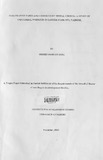| dc.contributor.author | Ommeh, Marilyn S | |
| dc.date.accessioned | 2013-05-21T09:11:10Z | |
| dc.date.available | 2013-05-21T09:11:10Z | |
| dc.date.issued | 2010-11 | |
| dc.identifier.citation | Masters of Arts Degree In Development studies | en |
| dc.identifier.uri | http://erepository.uonbi.ac.ke:8080/xmlui/handle/123456789/24101 | |
| dc.description | A Project Paper Submitted in Partial Fulfillment of the Requirements of the Award of Master
of Arts Degree in Development Studies. | en |
| dc.description.abstract | Paratransit operations playa key role in serving the mobility needs of both the low income
and the middle income populace in developing countries. The extent to which this means of
public transport is affordable is key in determining whether their basic mobility needs are
met. Matatu means of transport which is a form of paratransit in Kenya has grown over the
years since independence. Despite the increased numbers of matatu operations in Kenya, a
significant proportion of Kenyans in the urban setting continue to use non motorised means
of transport such as walking or bicycles to get to their work destinations.
This study interrogates the effects of paratransit fares on work trip modal choices of industrial
workers. It proposes that matatu fares affect commuters' modal choice, implying that
industrial workers may opt to use other modes of transport to get to work if they cannot
afford to pay for matatu use. The study objectives were met by carrying out a field survey and
case study interviews on the modal choices of industrial workers in Sameer Park EPZ. Key
informant interviews were also carried out to collect information on fares.
The study found that industrial workers who could not afford to use matatus for their work
trips relied solely on NMT or used matatus interchangeably with NMT. The study also found
that apart from fares, there were also other factors that influenced modal choice. A key
finding was that a significant proportion of industrial workers resided at informal settlement
areas which were close to Sameer Industrial Park. The study concludes that paratransit fares
influence industrial workers modal choices. The study recommends the establishment of a
fare regulatory board which would set and control fares of all public transport means. | en |
| dc.language.iso | en | en |
| dc.publisher | University of Nairobi | en |
| dc.title | Paratransit fares and commuters' modal choice: a study of . industrial workers in Sameer Park EPZ, Nairobi. | en |
| dc.type | Thesis | en |
| local.publisher | Institute for Development Studies | en |

